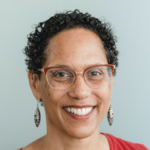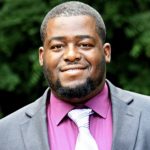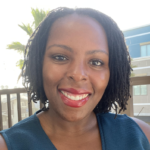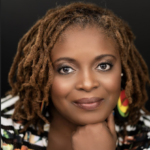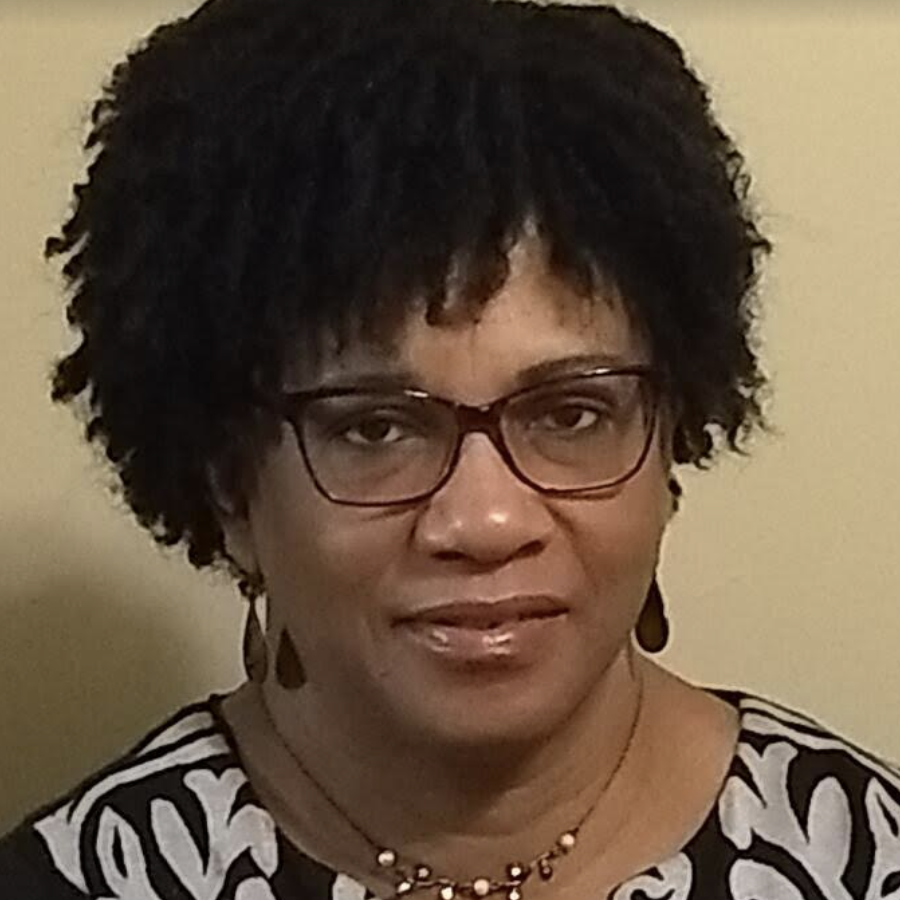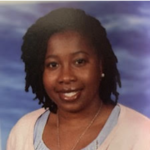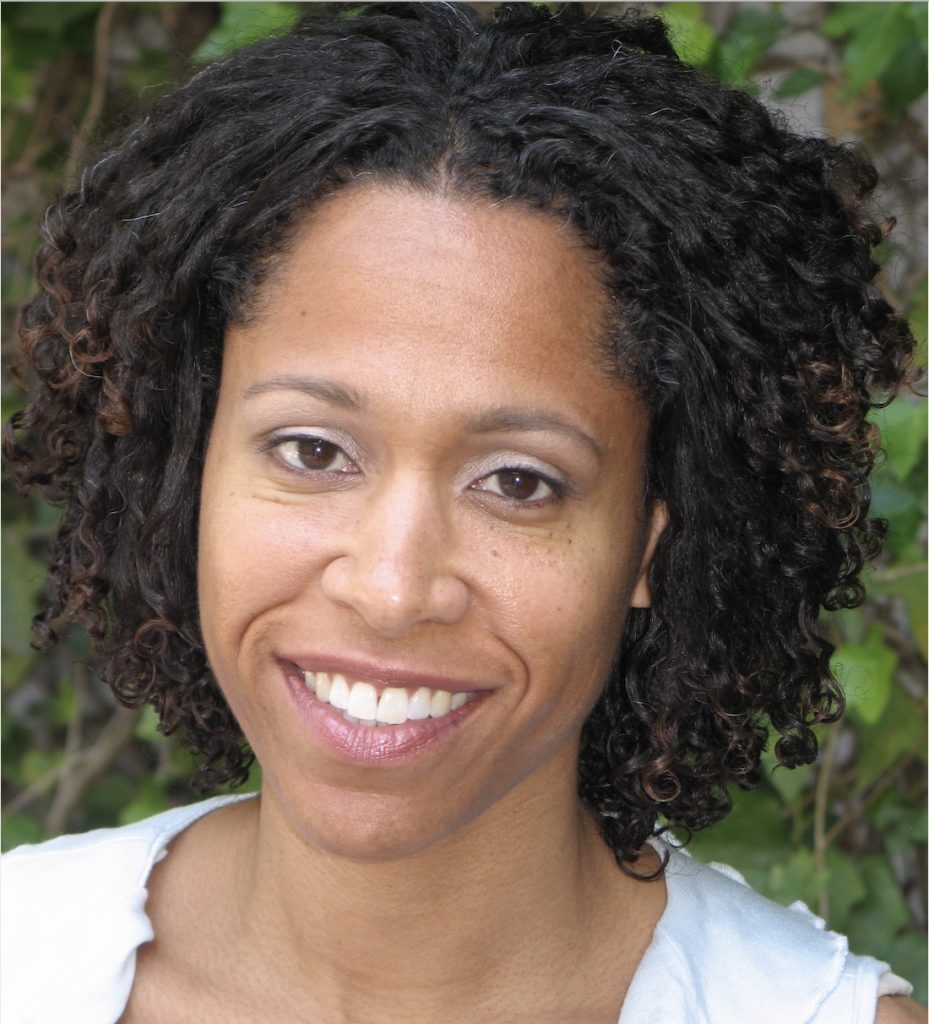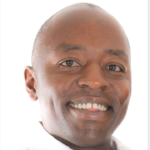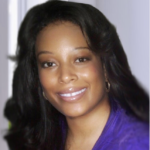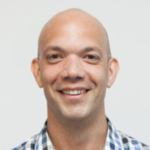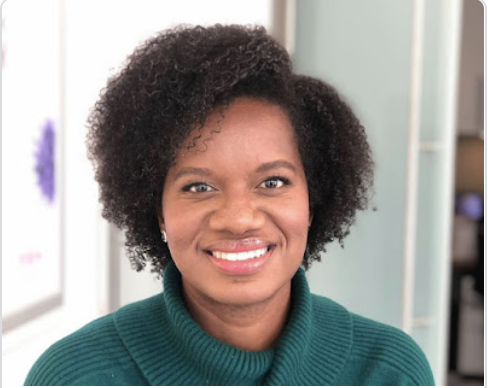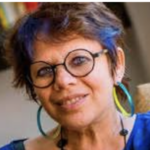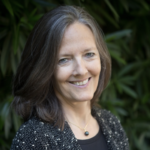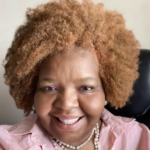Our vision is to create an ongoing, diverse cohort of people who are passionate about working together to develop initiatives and innovative approaches to addressing topics related to “AEDP & Healing Racialized Trauma.” Being attuned to the long-standing, historic and current oppression of global Black communities, and also to this historical moment in the USA, we have been deliberate in focusing on self-identified Black AEDP community members, asking them to take the lead to re-imagine ways that AEDP can address racialized trauma. In the future, we hope to broaden and build this initiative to include other marginalized communities and intersectional identities who experience oppression and systemic injustice.
This has led to the emergence of a group of 12 members of our self-identified Black AEDP community members who responded to an initial call to work this initiative in the early fall of 2021. Over the months, the groups cohered and the AEDP Vision Collective was born. Here is one description of the group in their own words: we are “a wise, committed and thoughtful group of Black-Identified therapists laying the foundation for a new vision of creating a more diverse and inclusive body of understanding within the AEDP Institute. This Collective has a lot of heart, a lot of grit, and a broad base of experience and knowledge to draw from. We embrace this opportunity to think outside the box of power and privilege and acknowledge that this is the time for AEDP to grow and expand the diversity of the contributors to its emergent growth.“
Now called the AEDP Vision Collective, this group (supported by the four AEDP Institute Consultants) have offered to lead four exploratory groups that will meet over the next year to focus on specific topics related to the application of AEDP to the healing of racialized trauma in the context of anti-Black racism.
Each of these groups will function independently, in partnership with our AEDP Vision Collective, will be Black led or co-led by members of the AEDP Vision Collective, and will include at least one person who is AEDP certified, or an AEDP supervisor or faculty member as an AEDP consultant and support.
Invitation to our self-identified as Black AEDP community members
Invitation to our self-identified as Black AEDP community members. If you are (i) a member of the AEDP community, (ii) identify as Black and (iii) are interested in joining us in this AEDP & Racialized Trauma Initiative, please contact the AEDP Vision Collective at VisionCollective@aedpinstitute.org (or admin@aedpinstitute.org). Please indicate which of the exploratory groups (see below) you might be interested in joining.
Please Note: If you and a other AEDP clincians are interested in exploring a different topic than the ones listed, and wish to create an additional exploratory group, please contact the AEDP Vision Collective at VisionCollective@aedpinstitute.org (or admin@aedpinstitute.org), and we would be happy to work together with you and support you.
Vision Collective News
Black History Month 2024 letter from the Vision Collective: A Celebration and Call to Action
By Sonya Parker, MSW, LCSW, LSSW, RYT and Kosu Boudreau, RP, MSW, RSW
The 4 Exploratory Groups (Topics and subtopics)
Please Note: If you and a couple of other AEDPers are interested in exploring a different topic than the ones listed, and wish to create an additional exploratory group, please contact the AEDP Vision Collective at VisionCollective@aedpinstitute.org (or admin@aedpinstitute.org), and we would be happy to work together with you and support you.
RACIALIZED TRAUMA & RELATIONAL ASPECTS of AEDP
Gerald Brooks; Peter Muhwati
To contact Members of the group please email Relationalhealing.VisionCollective@aedpinstitute.org
Relational healing: What is effective validation in the context of racialized trauma
a. By Black men for Black men: Black male with Black male relational healing
b. Black therapist /White client, White therapist /Black client: What should these dyads do: Evolving guidelines
for these dyads; Implicit and explicit biases; Therapist accountability
c. Black therapist/Black client: Addressing Black on Black disconnection
d. Racialized trauma for those with a colonial history background
e. Sexual racialized trauma (intergenerational) in the context of white supremacy and misogyny
RACIALIZED TRAUMA & SPIRITUALITY in AEDP
Nicky Cameron; Marsha Elliott; Sonya Parker; Lois Ridley; Connie Rhodes
To contact Members of the group please email Spirituality.VisionCollective@aedpinstitute.org
The role of Spirituality in working with racialized trauma in AEDP
a. The role of spirituality in working with racialized trauma and AEDP
b. Racialized trauma and the American Church (the most segregated public institution on Sunday morning in the
USA)
RACIALIZED TRAUMA & ATTACHMENT in CHILDREN
Mosaka Harris; Lois Ridley; Rafael Stepto
To contact Members of the group please email AttachmentInChildren.VisionCollective@aedpinstitute.org
Extensions and Applications of AEDP Theory: Effects of Institutionalized racism on attachment in children and implications for working with them. How to use AEDP’s perspective on attachment to work with children with relational trauma, and the therapists who work with them in the context of working with the consequences of institutionalized racism.
a. Working with children with relational trauma in the context of institutionalized racism
b. Working with the therapists who work with the children with relational trauma in the context of institutionalized racism
RACIALIZED TRAUMA AND AEDP, BLACK LIBERATION/BLACK JOY
Kosu Boudreau, Jennifer Jackson, Alana Tappin
To contact Members of the group please email BlackJoy.VisionCollective@aedpinstitute.org
Transforming the pathogenic affects of racialized trauma into the transformational affects of embodiment, empowerment and Black joy.
How to transform the pathogenic affects of racialized trauma (helplessness, disempowerment) using AEDP’s transformational theory: Working to support the emergence of embodiment, empowerment, and Black joy.
Vision Collective
Kosu Boudreau, RP, MSW, RSW
I am a mixed-race, black-identified psychotherapist/ social worker from Toronto, Canada with over 18 years’ experience working with trauma, addictions and end-of-life care. I am currently in private practice with a focus on trauma treatment using psychedelic assisted psychotherapy. I use an integrated, somatically-grounded, experiential approach, which includes: AEDP™, Internal Family Systems (IFS), Sensorimotor Psychotherapy, Acceptance and Commitment Therapy (ACT) and Psychedelic Assisted Psychotherapy (PAP). All of these therapies emphasize integration of mind/body/spirit and give primacy to the importance of relationship. I am also an experienced group facilitator, yoga teacher and long-time meditation practitioner.
I am passionate about supporting access and inclusivity for BIPOC therapists and clients. Being part of the Vision Collective feels like I have found a caring community of like-minded clinicians
who stand stronger together and are energized for change.
Gerald Brooks, LCSW
Gerald Brooks is a Licensed Clinical Social Worker based in Michigan and is also licensed in Nevada. He has a solo practice and works at Western Michigan University as a psychiatric social worker and a therapist for WMU Athletics.
His clinical experience includes working with children, adolescents, college students, and adults in various clinical settings. He is a Certified Advanced Alcohol and Drug Counselor (CAADC), Certified Professional Coach (CPC), and a Department of Transportation certified Substance Abuse Professional (SAP). He recently completed Essential Skills 1 in AEDP and is currently in core training working toward certification.
Karla Amanda Brown, LMFT
In 2016, I found myself dragging along towards the LMFT licensing exam. After steadying myself from the vicarous trauma of the murders of Philando Castile and Alton Sterling, I cycled into phases of anger and grief on behalf of Black people around the world. Thankfully, I was able to use these emotions to fuel my professional journey – once I decided to focus my energies on working with Black families. To my dismay, in professional development contexts, I have found myself jumping through emotional and cognitive hoops in order to keep myself emotionally safe and to carry the learnings towards my clients. Many of these clients live with extraordinary amounts of external constraints, are neglected by the powerful in our society and most are of the Global Majority.
As the CEO of the Silicon Valley based nonprofit, Soul Centric Counseling & Empowerment Center, I am in a position to promote the hiring and advancement of BIPOC mental health professionals. In a manner similar to AEDP’s promotion of “healing from the get-go,” I get to spend my days supporting pre-licensed clinicians with being effective and transformative from the get-go. I feel relieved knowing that I can confidently point my employees towards the AEDP Institute, which is generously making strides to educate Black clinicians, and those of other marginalized identities, while genuinely supporting our work with anyone who sits before us with the desire to transform and grow.”
Nicky Cameron, LCSW
Nicky is the Founder of Emergent Counseling & Consulting a specialty practice in Fort Lauderdale, Florida. She is a Licensed Clinical Social Worker and Specializes in Holistic Trauma Recovery. Nicky partners with teenagers and adults who are living with the debilitating symptoms of Post-Traumatic Stress Disorder.
Nicky has over sixteen years’ serving in various capacities within the field of Behavioral Health. She is an Active Parenting Facilitator, a Certified Behavioral Health Case Management Supervisor, a Life Skills Coach, a Motivational Speaker, and a Qualified Clinical Supervisor for individuals pursing licensure to be therapists in the State of Florida.
Nicky is trained in AEDP, Brainspotting, EMDR, and Emotional Freedom Technique (Tapping). Nicky is also Internal Family Systems informed.
Marsha Elliott, LMSW
Marsha Elliott retired recently from the NYC Department of Education where she worked as a social worker and administrator for 30 years. She recently felt drawn back to her “first love” as a therapist and found AEDP as a perfect fit to hone her skills. “I consider it a privilege to work with the AEDP Vision Committee”.
Mosaka Harris, LCSW
Mosaka Harris is a Licensed Social Worker based in Westchester County, New York. She has years of experience working with children and families. She is an AEDP level 2 therapist who fell in love with AEDP when she attended the Healing Relational Trauma seminar in 2018. In her work experience, AEDP has been a game-changer in supporting children in undoing the aloneness from years of complex trauma. Mosaka is honored to be a part of the Vision Collective.
Jennifer Jackson, LCSW
Jennifer is a lecturer and internship coordinator and advisor at University of California, Berkeley School of Social Welfare since 2010. She works closely with students in the behavioral health and health concentrations. Her areas of practice and teaching are trauma-informed care and treatment, attachment and relationally based clinical practice, and anti-oppressive and justice promoting practice. She has worked extensively in the field with trauma survivors as well as those with severe mental health conditions. Jennifer is a Licensed Clinical Social Worker and has supervised MSW interns and ASWs. She also consults with agencies regarding vicarious trauma and practitioner and organizational resilience.
Peter Muhwati
Peter is a Clinical Social Worker from Zimbabwe living in Johannesburg, South Africa.He uses attachment-based, experiential approaches to therapy with individuals and couples. His clinical experience also includes work within palliative care in Zimbabwe. Peter hopes one day to be Certified in the model.
He completed his higher education at Penn State University and Royal Holloway, University of London. Following his undergraduate degree, he entered the religious life of the Franciscan Friars. He is still guided by Franciscan Spirituality.
Peter is married with two children.
Sonya Parker, LCSW
Growing up in a military family, Sonya was exposed to different populations and cultures across the United States and other countries. Those multicultural experiences helped shape Sonya’s ecological view and became more important as she grew older and began to witness racial inequities and oppression. Sonya was led to a career of advocacy and care for others. She obtained an undergraduate degree in Psychology and a Masters of Social Work degree from the Joint Masters of Social Work Program of North Carolina Agricultural and Technical State University and The University of North Carolina at Greensboro. She is a Licensed Clinical Social Worker in North Carolina who has worked with a variety of populations in various organizational and clinical settings
Sonya is a Level II AEDP therapist. She is also a Registered Yoga Teacher (RYT-200) having completed a yoga teacher training program for behavioral health professionals with a focus on anxiety and depression. Sonya’s therapeutic approach and stance is grounded in psychodynamic, neurobiological, attachment, emotion, relational and experiential theories. In addition, Sonya has completed advanced training as a couples therapist in Gottman Method Couples Therapy and Emotion Focused Therapy.
Sonya has provided both individual and couples therapy in her career. She believes therapy is a collaborative process between her and her patients and clients in achieving balance, wellness and wholeness. She believes in a holistic approach to psychotherapy, respecting individuals as a whole – their uniqueness, values and goals. Sonya understands both personally and professionally, the impact attachment patterns and internal conflict coupled with life challenges that can emerge and become painfully, sometimes paralytically, overwhelming. It is in times such as this when therapeutic support is vital to help overcome crippling pain and patterns that keep us feeling stuck. It is also in times such as this when connection is most needed to establish safety and security to transform patterns to help us heal and live more productive lives.
Sonya believes that each person has the capacity for change and growth within them which is fostered with the help and support of others. It is no wonder she was led to a career in social work and the AEDP Vision Collective. AEDP has become Sonya’s therapeutic home. As a member of the AEDP Vision Collective, Sonya hopes to champion social advocacy and incorporate the mission and values of the AEDP Institute by means of her clinical work and initiatives set forth by the AEDP Institute to combat racial inequity and promote diversity, inclusion and belonging across behavioral health, government, educational and community institutions.
Heloise (Lois) Ridley, LPC
Heloise (Lois) is a Licensed Professional Counselor seeing clients online within the state of Pennsylvania.Lois specializes in helping caregivers struggling with their children and parenting strategies by giving them support in healing their attachment trauma. She also supports adults struggling later in life connecting with others, establishing healthy boundaries, and communicating in relationships due to early childhood trauma.
If you are struggling with parenting, adulting, family, grief, anxiety, depression, shame, anger, chronic stress, life transitions or racialized generational trauma, you are not alone. Lois brings a warm, engaging, empathetic, and genuine presence into the counseling relationship to support your healing journey.
Rafe Stepto, LCAT
Rafael Stepto, LCAT, is a music therapist based New York. He works with children and young adults mainly, often within their own communities, as they explore their growth, losses and futures unfolding. He works in a emotional focused way and often uses artisitic creativity as a container and metaphor for growth.
Alana Tappin, PsyD., C.Psych
Dr. Alana Tappin is a licensed clinical psychologist, and the owner/operator of a
private psychology clinic that specializes in psychological support for
marginalized and racialized people. Based in Toronto, Ontario, Canada,
she conducts psychological assessments, treatment and consultation to
children, teens and adults. Dr. Tappin also provides supervision and
training to students, pre-licensed and licensed mental health therapists. She
has long had an interest in the psychological impact of racism and offers
trainings on whiteness, shame and racism, and offers anti-oppression and anti-racism
training to community organizations, universities, and private businesses. Dr. Tappin
earned her doctorate degree from Long Island University, C.W. Post
Campus in 2012, with a specialization in family violence. She served as vice
president for an organization connected to her doctoral program called
Students for Multicultural Awareness, Research and Training (SMART).
Dr. Tappin and her colleague Robin Schlenger, LCSW, have co-written a book
chapter in press titled Transforming the Shame of Whiteness for Collective Healing
which focuses on ways to address the deep shame that often comes with complicity in
white supremacy. Dr. Tappin developed the idea of applying shame resilience theory
(by Dr. Brene Brown) to racial justice. She and her colleague Robin Schlenger,
LCSW, co-developed a training series based on this idea entitled Shame Resilience
and Transformational Skills for White People and Overcoming the Shame of
Internalized Racialization for BIPOC. She is working on a developing a new training
series entitled Addressing the Pain of Internalized Anti-Blackness and does anti-
racism trainings for mental health professionals.
Dr. Tappin is a faculty member at The Institute for Advanced Psychotherapy at Loyola University in
Chicago where she teaches about the intersection of systems of power, oppression and
the therapeutic process and leads weekly case consultations for students pursuing a
postgraduate training in advanced psychotherapy.
Vision Collective Consultants
Diana Fosha, PhD
Diana Fosha, Ph.D. is the developer of AEDP, and Founder and Director of the AEDP Institute. For the last 20 years, Diana has been active in promoting a scientific basis for a healing-oriented, relational, experience-near therapy model for treating attachment trauma. Her most recent work focuses on flourishing as a seamless part of the process of transforming emotional suffering. Described by psychoanalyst James Grotstein as a “prizefighter of intimacy,” and by David Malan as “the Winnicott of [accelerated experiential] psychotherapy,” Diana’s writing is powerful and precise, yet poetic and evocative. Her phrases —“undoing aloneness,” “existing in the heart and mind of the other,” “stay with it and stay with me,” “rigor without shame” and “True Other” — capture the ethos of AEDP.
“While I tend to identify as a New Yorker, I am a white cis heterosexual woman, born in Romania, who immigrated to the US with my family at the age of 12 to escape anti-semitism and totalitarian communism. I am deeply allergic to charismatic leaders who demand blind loyalty and unquestioning allegiance. Humbled by the gifts I have been given, and mindful of the power of my position, I want to use them to the utmost. Over the last two years, my commitment to explore how AEDP can help heal and transform racialized trauma therapeutically has only grown. As a devout believer in our capacity to heal & transform, and a big fan of emergence, I am honored to support the work of the AEDP Vision Collective and excited by the contributions to AEDP that will emerge from the Vision Collective’s engagement with the vitally important topic of AEDP and racialized trauma.”
Lynne Hartwell, Administration
Lynne has spent most of her working career in product development and project management with significant work and life experience in Asia. She is the only member of the Vision Collective who is not a mental health professional. Lynne has been involved with the institute since 2014 playing many behind the scenes roles including helping to launch and oversee the efforts of the AEDP Institute Scholarships including the Diversity and Pay What You Wish Scholarships. Lynne has been active on DBEI committee since Oct 2019 and participated in the “Groundwater” antiracism training with the Racial Equity Institute (REI) and a 14 week online training for non-Black therapists in anti-Black racism developed by Dr. Mosley and a group of clinical psychologists.
Karen Pando-Mars, MFT
Karen is one of the senior faculty of the AEDP Institute. She has been a licensed psychotherapist since 1989, and works with individuals and couples in San Anselmo, CA. She supervises and teaches AEDP internationally. Currently she is a member of the DBEI Committee and liaison to the Director and Admin team. Karen draws upon her experience as a teaching member of the AEDP faculty since 2009 with passion and dedication to Diversity, Belonging, Equity and Inclusion, especially in the classroom.
She chaired the Education Committee and served on the Executive Committee of the AEDP Institute from 2011 to 2018. As well as being a teacher, clinician, supervisor and writer, Karen fosters community building as one of the founders of the SF Bay area’s AEDP West and first emissary to Israel. And now she is thrilled to witness and be a consultant to this vibrant Vision Collective, whose mission to lead cohorts of Black clinicians to address topics related to AEDP and racialized trauma feels like imperative collaboration to meet the current historic moment in the US.
Karen has roots in Peru and Argentina and grew up in the suburbs of New York City. While visiting family in Peru after graduating with a BA in Spanish literature, Karen came to question “What motivates people beneath culture?” and returned to the US to study psychology. Now, she realizes that her experiences with AEDP have provided multiple opportunities to engage this question, and the work of this Vision Collective offers another. She identifies as a CIS, heterosexual, white woman, who continues to explore the influences of her privilege and class, to lessen their unconscious bias, and bring conscious use of power to serve DBEI values in the AEDP community and in the world in which she lives.
Connie Rhodes
Connie Rhodes, affectionately known as the Peace Promoter, is a graduate of the University of Chicago with a concentration in Behavioral Sciences and Psychology. While at the University of Chicago, she had the honor to complete advanced studies with experiential psychotherapy pioneer Dr. Eugene Gendlin. During her time with him, she developed her client centered therapy approach and learned the art of focusing and imagery.
Connie is the founder and executive director of Restoration Incorporated, a premier faith-based human service agency. She is also the lead consultant for Culturally Competent Consulting, helping organizations with their diversity, equity and inclusion needs. Connie is a trailblazer in diversity equity and inclusion work. She uses a holistic approach that uses indigenous, cultural and spiritual healing practices to create communities that promote anti racism and belonging.
Connie has facilitated countless trainings spanning over 25 years. In addition to DEI, her expertise includes youth violence prevention and healing community trauma. Her vast experience in the social service arena includes her 16 years at BUILD Inc. where she worked in some of Chicago’s toughest neighborhoods, and her work in Minneapolis helping young victims of gun violence.
Connie uses the AEDP modality to help bring healing and decrease aloneness for marginalized communities, such as in her role as a certified Circle Keeper. Connie has received awards from the Cook County Probation Department for her work with young women, the City of Minneapolis Local Public Health Hero Award with the Next Step team, and the 2017 Amy Aim Humanitarian Award from ILCC for her work impacting youth in our community. She is an advocate for restoring peace and hope in our communities via her strong faith in God.
The AEDP Institute has partnered with Connie and Culturally Competent Consulting to support the Institute’s commitment to antiracism and further our initiatives in diversity, equity and inclusion.

